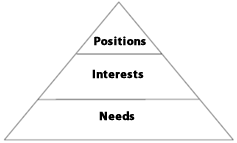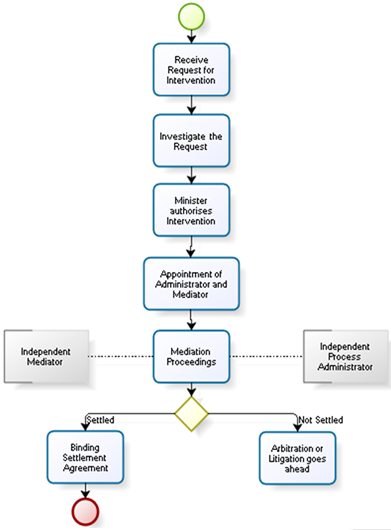Environment Sector Conflict and Dispute Resolution
Introduction and background
“Like the resource it seeks to protect, [environmental management] must be dynamic, changing as conditions change, seeking always to become more effective.”- Rachel Carson (1907-1964)
With increasing pressure on our natural resources, environmental disputes are an increasing part of environmental management. It is important that these are managed effectively.
Chapter 4 of the National Environmental Management Act, 107 of 1998 (Act no. 107 of 1998) (NEMA), authorises the use of alternative dispute resolution mechanisms so as to ensure fair decision making and effective conflict management.
The act (in section 17(2)) gives some guidance in this regard by stipulating that decisions regarding dispute resolution must be made taking into account -
(a) the desirability of resolving differences and disagreements speedily and cheaply;
(b) the desirability of giving indigent persons access to conflict resolution measures in the interest of the protection of the environment;
(c) the desirability of improving the quality of decision making by giving interested and affected persons the opportunity to bring relevant information to the decision making process;
(d) any representations made by persons interested in the matter; and
(e) such other considerations relating to the public interest as may be relevant.”
The Department of Environmental Affairs is mandated to perform the functions prescribed in terms of Chapter 4 of NEMA. The DEA's mandate is to create a framework for integrated environmental planning and management, and ensure co-ordination within government and with outside stakeholders.
Legislation
The DEA obtains its mandate from Chapter 4 of the National Environmental Management Act, 107 of 1998 (Act no. 107 of 1998). The act defines the circumstances in which conciliation (effectively mediation), arbitration and process facilitation may be used to resolve environmental disputes.
| Summary of processes authorised in terms of NEMA Chapter 4 | |||
| Facilitation | |||
| WHO may authorise | In respect to WHAT may it be authorised | WHEN may it be authorised | |
| 1 | Minister | An identified difference or disagreement (regarding the management or protection of the environment) | At any time, when requested |
| [Referral ito Sect 17(2)] | |||
| Conciliation | |||
| WHO may authorise | In respect to WHAT may it be authorised | WHEN may it be authorised | |
| 2 | Minister / MEC / Municipal Council | A difference or disagreement which may significantly affect the environment | When the difference or disagreement concerns the exercise of any of its functions |
| [Referral ito Sect 17(1)(a)(i)(aa)] | |||
| 3 | Minister / MEC / Municipal Council | A difference or disagreement regarding the protection of the environment | When an appeal regarding that dispute is brought under any law before him/her |
| [Referral ito Sect 17(1)(b)(i)(aa)] | |||
| 4 | Court or Tribunal | A dispute regarding the protection of the environment | When it is hearing that dispute |
| [Referral ito Sect 17(3)] | |||
| Arbitration | |||
| WHO may authorise | In respect to WHAT may it be authorised | WHEN may it be authorised | |
| 5 | The Parties | A difference or disagreement regarding the protection of the environment | When the parties have agreed to refer the dispute to arbitration |
| [Referral ito sect 19] | |||
| Investigation | |||
| WHO may authorise | In respect to WHAT may it be authorised | WHEN may it be authorised | |
| 6 | Minister | A matter relating to the protection of the environment that requires evaluation | At any time, after consultation (where relevant) with a Municipal Council or MEC or another national Minister |
| [Referral ito Sect 21] | |||
Policy considerations
The DEA's mandate informed by the following policy considerations:
- Disputes are disruptive to the aims of environmental management. They create mistrust, block proper communication, and end up being costly in terms of expenditure, time management, and lost opportunities.
- Litigation must be used selectively, and preferably as a last resort for dealing with environmental dispute. Litigation remains an important mechanism for dealing with environmental disputes. It serves to bring finality to disputes. It must be recognised though, that litigation does not necessarily bring about an ideal outcome in terms of environmental management and economic development goals.
- Conciliation and facilitation should be regarded as preferred mechanisms (as against litigation) for dealing with environmental disputes. It is accepted that such mechanisms have a proven history in the South African context, as well as internationally.
Alternative dispute resolution (ADR)
ADR usually refers to the use of conciliation, mediation and arbitration to resolve disputes.
Conciliation or Mediation is a process where disputing parties get together with the help of a mediator to resolve their dispute. The mediator is an independent person who assists them by developing options, considering alternatives and isolating issues. The aim is to reach an agreement everyone can live with, rather than having a settlement imposed on them by a court.
Mediation is effective, because the mediator gets the parties to focus on their needs and interests. Very often these overlap or are compatible, and the parties can agree on a solution to the problem.
Where the focus is on the legal positions - as is the case in litigation - it is usually much more difficult to find common ground.
Arbitration is a process where the disputing parties agree to the appointment of an independent party (the arbitrator) to make a binding decision about their dispute.
Some disputes cannot be resolved by mediation. In such cases a binding decision is required, and arbitration offers an alternative to referring the case to Court. Arbitration is an attractive alternative where:
- a quick outcome is needed, or where
- the presiding officer needs specialist knowledge to be able to make a determination.
NEMA Chapter 4 confirms that parties are entitled to agree to refer a dispute to arbitration in accordance with the provisions of the Arbitration Act 42 of 1965. The decision of an arbitrator is final, and can in terms of this Act be made an order of Court.
The dispute resolution process
Anyone involved in an environmental dispute can request an intervention in terms of NEMA Chapter 4.
Once the department receives your request, it will:
- Verify that the request falls inside the scope of NEMA Chapter 4
- Fully investigate the circumstances of the case
- Facilitate compliance with the procedures prescribed by NEMA Chapter 4 in order to obtain a decision from the Minister regarding your request.
(Please note that in some cases the authority to allow an intervention lies with the relevant MEC or the Municipal Council.)
Once the Minister has authorised an intervention:
- DEA will appoint an independent process administrator for the case
- The appointed administrator will facilitate the selection of an independent mediator and organise a meeting between the parties and the mediator
- If the mediator is able to facilitate an agreement between the parties, the terms of that agreement will be put in writing and signed by the parties.
Such an agreement will be binding on the parties.
- If no agreement is possible, the mediation will terminate, and the parties may pursue other measures (such as arbitration and or litigation) to resolve the matter.
Refer a case
Anyone involved in an environmental dispute can request an intervention in terms of NEMA Chapter 4. Any such request should be made by completing the request for intervention form, and submitting it to the Department of Environmental Affairs.
An “environmental dispute” can be viewed as any existing or anticipated difference or disagreement or dispute regarding the protection of the environment or the use of natural resources.
Panel of Mediators and Arbitrators
The appointment of the arbitrators and mediators is taken from Chapter 4 of NEMA, which reads, "The Minister may create a panel or panels of persons from which appointment of facilitators and arbitrators in terms of this Act may be made, or contracts entered into in terms of this Act. The Directorate: Environment Sector Conflict and Dispute Resolution has advertised invitations of expressions of interest on the Sunday Times newspaper to invite qualified mediators and arbitrators to apply to serve on the Panel of Mediators and Arbitrators in compliance with Section 21 (2) of NEMA Chapter 4.
Click on the link below to see the list of the panel.
Related information
- Chapter 4 NEMA - Fair decision making and Conflict Management (brochure)
- Frequently Asked Questions
- Environmental Mediation! Let’s engage - Rather than confront (poster)



